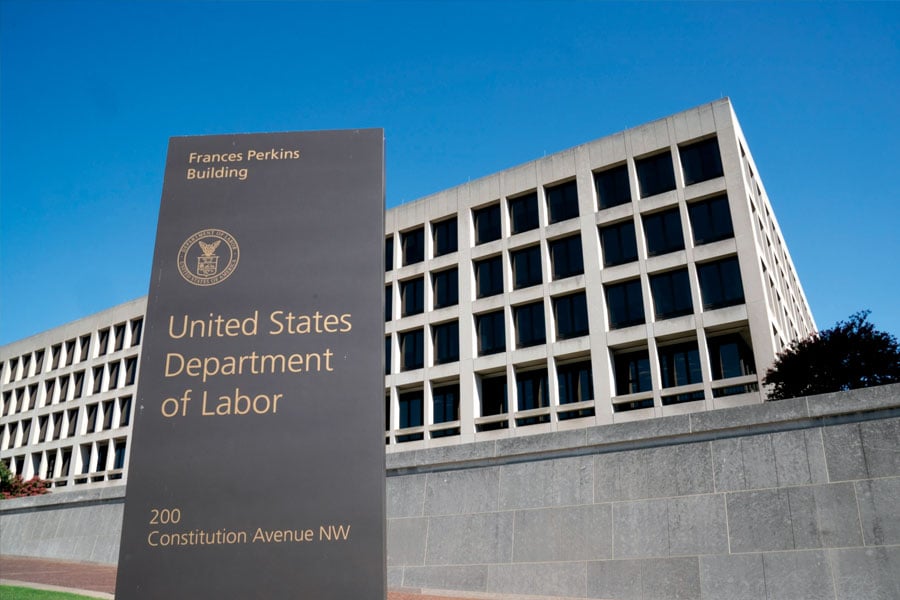

In a surprising reversal, the DOL has backed off from defending its guidance around a Trump-era fiduciary rule in court, indicating that it could soon embark on a new rulemaking course for retirement account financial advice.
Only a month ago, the Department of Labor filed an appeal of a Florida District Court’s decision in February that mostly sided with the American Securities Association, which had sued the DOL in February 2022. That group today announced that the DOL had decided not to pursue the appeal.
The lawsuit came in response to the DOL’s guidance, in the form of answers to frequently asked questions, that a single recommendation to roll money out of a defined-contribution plan to an individual retirement account could trigger fiduciary status under the Employee Retirement Income Security Act.
Initially, the Biden Administration chose not to work to undo the Trump-era fiduciary rule, instead offering guidance on it in 2021 that more closely reflected its stance on rollover advice.
But the change in the DOL’s direction hardly means that it's going to abandon a higher fiduciary standard, lawyers say. Most likely, it hints that the agency is racing to issue a new fiduciary rule proposal and get a final version published before the end of President Biden’s first, and potentially only, term in office.
“The most likely interpretation of that move is that the DOL will be sending a new proposed fiduciary regulation to the Office of Management and Budget in the next few days or, at the most, weeks,” Fred Reish, partner at Faegre Drinker, said in an email. “I don’t think it is reasonable to view this as the DOL backing away from the position that rollover recommendations are fiduciary acts. That is inconceivable in light of their statements over the years, for example, in the preamble to the Obama era fiduciary regulation and in the preamble to Prohibited Transaction Exemption 2020-02.”
Likely, “the DOL has drafted a new proposed regulation defining fiduciary advice and that the proposal will define fiduciary advice to include rollover recommendations,” Reish said.
But rolling out a new rule is hardly a fast process, and there will almost certainly be complications along the way.
“The clock is definitely against the department,” said Michael Kreps, principal at Groom Law Group.
Once a proposed rule is submitted to the Office of Management and Budget, it often takes at least a month before it's published and available for public comment, Kreps said. Following that, the DOL would have to collect input, write a final version of the rule, wait for an economic analysis and then publish the final version.
“Best case scenario, you’re looking at a final rule, if everything goes as planned, by middle of next year, which puts you at risk of the Congressional Review Act challenge, if Congress is to flip,” Kreps said.
On top of that, “Congress can step in at any time and tell DOL not to proceed,” he said. Republican legislators would very likely move to defund the DOL’s ability to move forward with a rule proposal, Kreps noted.
The DOL referred a request for comment about the lawsuit to the Department of Justice, which initially did not comment and declined to confirm that the appeal was being dropped. On Tuesday, the DOJ provided the legal filing to voluntarily dismiss the appeal.
That case really comes down to "how is DOL trying to reinterpret its own longstanding rule to achieve some of the objectives that they made in their 2015 rule that was struck down by the courts,” Kreps said. “If you’re the DOL, and you believe that advice should be more broadly construed, then it’s pretty clear that the regulation itself is what’s causing the problem. That would mean you’ve got to change it.”
Currently, the DOL’s rule allows financial professionals to receive otherwise-prohibited compensation through retirement accounts via prohibited transaction exemptions. Those professionals must show that they are acting in a client’s best interest.
The regulation on the books also uses a longstanding five-part test for fiduciary status applied to rollovers. The DOL was also sued in federal court in Texas last year over its handling of the regulation by the Federation of Americans for Consumer Choice — a case that has not been settled.
The Insured Retirement Institute, an industry group, said it was pleased to see that the DOL is backing off from its defense of its interpretation of the Trump-era rule.
“We were not expecting that, especially given that they had filed a notice of appeal not that long ago,” said Jason Berkowitz, chief legal and regulatory affairs officer at IRI. “We’re glad to see that [the District Court’s order] will continue to stand.”
If the DOL does soon move forward on a new fiduciary rule proposal, “there are some logistical and timing challenges they’ll have to navigate,” including the pending confirmation of Biden nominee Julie Su as Labor Secretary, Berkowitz said.
However, the IRI and other industry groups have taken the stance that current regulations, along with the Securities and Exchange Commission’s Regulation Best Interest, provide effective protection for consumers, he noted.
Additional regulation is not necessary, Berkowitz said. “The vast majority of financial professionals already act in their clients’ best interest.”
This story was updated Tuesday to reflect a response from the Department of Justice.

Relationships are key to our business but advisors are often slow to engage in specific activities designed to foster them.

Whichever path you go down, act now while you're still in control.

Pro-bitcoin professionals, however, say the cryptocurrency has ushered in change.

“LPL has evolved significantly over the last decade and still wants to scale up,” says one industry executive.

Survey findings from the Nationwide Retirement Institute offers pearls of planning wisdom from 60- to 65-year-olds, as well as insights into concerns.
Streamline your outreach with Aidentified's AI-driven solutions
This season’s market volatility: Positioning for rate relief, income growth and the AI rebound
